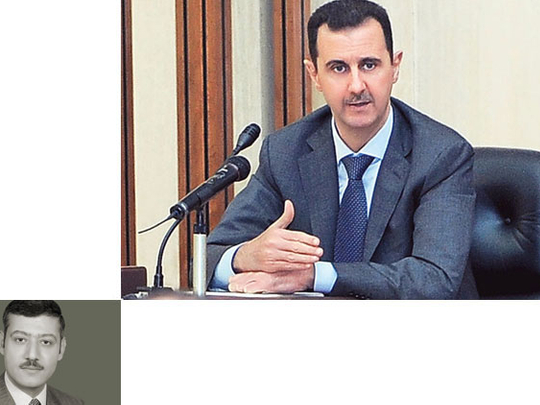
Recent statements by senior Iranian officials calling upon Syrian president Bashar Al Assad to stop violence against peaceful protesters and undertake genuine reforms instead have generated significant interest amongst analysts and diplomats. Some have interpreted these statements as if Iran was abandoning its main Arab ally. Others took them as a sign of the imminent collapse of the regime in Damascus and the argument was therefore that Iran may have been trying to mend fences with the Syrian people after it became fully convinced that the Al Assad regime will not be able to weather the storm this time. A closer look at Iranian foreign ambitions may suggest however that no major shift can be truly detected concerning Iran’s original position on the Syrian crisis.
In fact, from the start of the Arab Spring, Iran has been trying to assume intellectual and geopolitical leadership of the unrest in the Arab world. Iran is well aware that it is in competition with Turkey over leadership for the Middle East and that Ankara is in a far better position than Iran economically, diplomatically and religiously as a Sunni power to assume that role. All this did not deter Iran from trying to position itself as the champion of the Arab masses who have risen up in opposition to autocratic regimes, however. The sheer number of Iranian officials who are fluent in Arabic highlights the efforts of Tehran to overcome the ethno-linguistic geopolitical constraints it faces as a Persian country trying to operate in a region where most Muslim countries are Arab. While its anti-US and anti-Israeli position has allowed it to circumvent the ethnic factor and attract support in the Arab and Muslim worlds, its Shiite sectarian character has allowed competitors in the region — mainly Turkey — to restrict Iranian regional influence.
Furthermore, while Iranian officials have from the start been praising Arab revival and stressing the need to support the Arab masses in their struggle against autocracy, one unmistakable tension was clear. The crisis in Syria has proven embarrassing for Iran. The Iranian regime has been having a hard time trying to reconcile its support for the Arab unrest on one hand and supporting the Syrian regime against its opposition on the other. Calls to stop violence in Syria can hence be interpreted as an attempt to show consistency in Iran’s policy concerning Arab revolutions. It does not necessarily indicate a shift in policy.
Other reasons support the argument that relations with Syria are unlikely to undergo fundamental change despite the rhetoric. The factors which have contributed to the establishment, endurance and stamina of the Syrian-Iranian alliance have nothing to do with the domestic conditions of the two countries. If the case was otherwise, then Syria and Iran would have been sworn enemies rather than allies. The ideological outlook of the two regimes, for example, should act as a source of tension. The Arab nationalist regime in Damascus would naturally find itself at odds with the religious Shiite nationalistic regime in Tehran.
The internal politics of the two countries do not therefore help understand their relationship. Realpolitik, the regional balance of power and threat perceptions are the raison d’etre for the strong Syrian-Iranian ties. Over the past three decades, these factors have proven to be the unshaken pillars of the most effective partnership in the Middle East.
From an Iranian perspective, relations with Syria are extremely important to further its regional ambitions. Syria is viewed by Tehran as a primary partner in the Arab-Israeli conflict, offering Iran a symbolic political role in the central cause of the region. The occupation of Iraq increased Syria’s importance to Tehran, giving it vital access to most of the region’s problems. Through Syria, Iran could use most of its regional cards as a bargaining chip concerning its nuclear programme and threats by the US military. For all these reasons it is incomprehensible to expect Iran to abandon its most precious regional ally. That is particularly true at a time when Iran believes that it has come so close to realise its dream — transforming itself into a regional leader.
In fact, the long-awaited moment for Iran is fast approaching. Preoccupied with re-election and the economic crisis, US President Barack Obama is preparing to leave Iraq by the end of this year. The political vacuum left behind will certainly be filled by Iran. Losing Syria at this juncture could be of disastrous impact on Iran’s grand regional design. Calling upon Syria to introduce internal reforms cannot hence be interpreted as a sign of abandonment. Rather, it is an attempt to rescue the most enduring alliance in the history of the modern Middle East.
Dr Marwan Kabalan is Dean of the Faculty of International Relations and Diplomacy, Kalamoon University, Damascus, Syria









